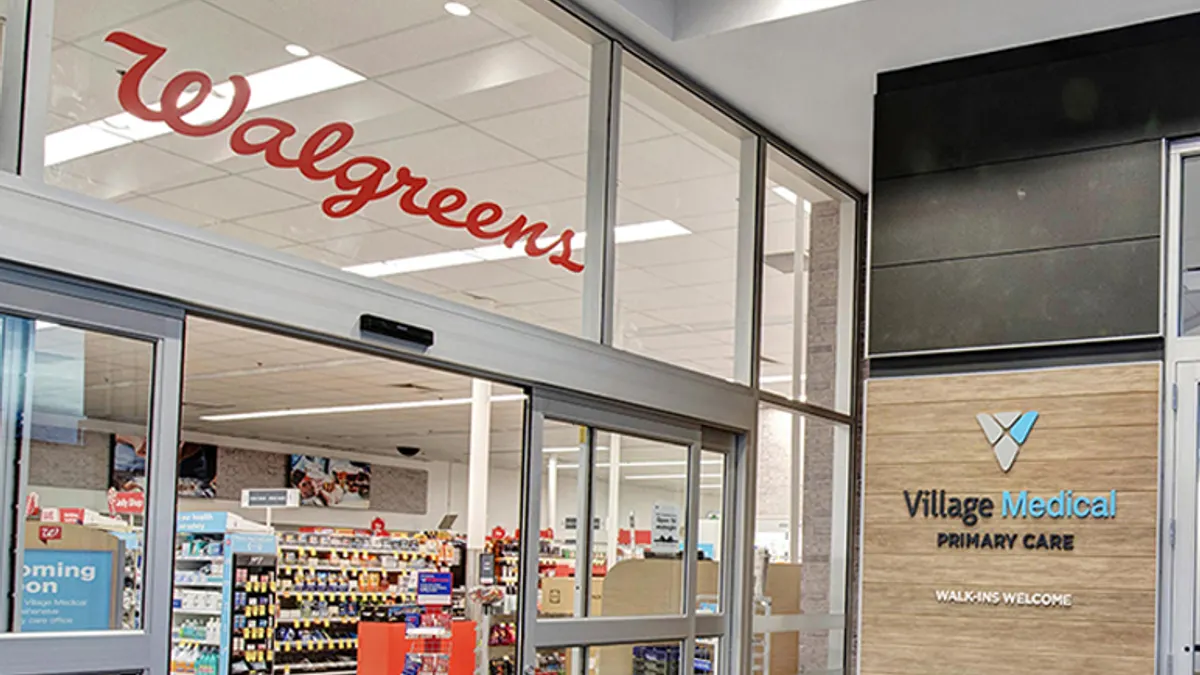Dive Brief:
- Walgreens is officially a private company after the troubled retailer’s $10 billion sale to private equity firm Sycamore Partners closed Thursday.
- Moving forward, Walgreens’ healthcare subsidiaries Shields Health Solutions, CareCentrix and VillageMD will operate as separate businesses. The Boots Group, Walgreens’ international retail pharmacy chain, will also be spun out, creating five standalone companies.
- Sycamore appointed retail veteran Mike Motz as Walgreens CEO, replacing current chief executive Tim Wentworth. Motz has formerly served as CEO of Staples U.S. Retail, a Sycamore portfolio company, and as president of Canada-based pharmacy chain Shoppers Drug Mart.
Dive Insight:
Rumors of Walgreens’ sale swirled for months before it was announced in March, as the company’s core retail pharmacy business struggled and a pivot to offering healthcare services failed to yield the return on investment that executives expected.
Walgreens shareholders overwhelmingly approved the sale to Sycamore and former Walgreens CEO Stefano Pessina in July, after Wentworth said the buying coalition might have the leadership expertise to help the retailer address mounting financial pressures head on.
Though Wentworth is being replaced as CEO, the executive will remain on with the company as an ongoing director, the company said. John Lederer, a former director of Walgreens and a senior advisor to Sycamore, has been named Walgreens’ executive chairman.
CareCentrix, Walgreens’ home health business, will keep its leadership structure in place, with Steve Horowitz at the helm as CEO. As of press time, primary care chain VillageMD had not yet released details about how the acquisition might impact its leadership strucure.
“Today represents an exciting new chapter and a turning point for Walgreens,” Motz said in a statement Thursday. “As a private organization, alongside our dedicated team members, we are renewing our focus on our core pharmacy and retail platform, our stores and our customer experience — building on the progress that’s been made.”
Not everyone is excited about the deal. The Private Equity Stakeholder Project, which bills itself as a watchdog organization rooting out the impacts of private investment, said in March it was “very wary” of the deal, noting several of Sycamore’s portfolio companies have filed for bankruptcy.
The watchdog group further noted that Sycamore appears to be paying for the acquisition mostly using debt, which could leave Walgreens financially vulnerable down the line.
“This leveraged buyout tactic saddles private equity-owned companies with substantial debt, often draining resources that could otherwise be invested in innovation, workforce development, or adapting to market changes,” the organization said its March report.
The deal comes over a year after Walgreens was downgraded by credit rating agencies. Analysts warned that the company was struggling to address plummeting pharmacy margins and declining retail sales.
Part of Walgreens’ financial struggles also stemmed from its venture into the healthcare delivery space.
Walgreens has spent billions of dollars investing in medical clinics through its VillageMD venture. However, the retailer failed to see profits materialize as quickly as leadership would have liked, leading Walgreens to close underperforming clinics. Last year, Walgreens said it was considering a full sale of the primary chain operator.
Despite embarking on a turnaround plan, including cutting costs and significantly reducing its store footprint, the company has continued to report heavy losses this year. In the third quarter, Walgreens reported a net loss of $175 million, a decrease of $519 million compared to the same period last year.
Walgreens also continued to carry high levels of debt ahead of the sale, reporting $429 million in short-term debt and nearly $7 billion in long-term debt in the nine-month period ending May 31.
Sycamore Partners’ portfolio includes several other retail brands that were once on the brink of financial hardship, including Belk, Staples and Lane Bryant. The private equity firm does not have extensive exposure in healthcare.












